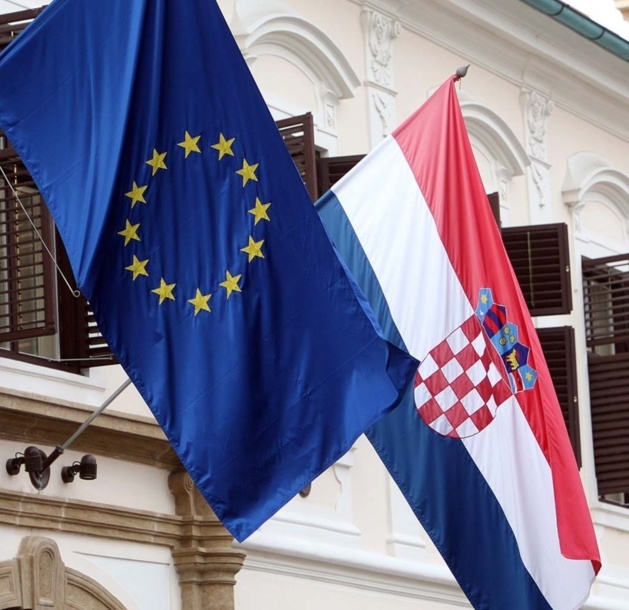
Photo -- Belga/EPA/A.Bat
« Welcome to the European Union » declared José Manuel Barroso, President of the European Commission, to Croatians gathered in Zagreb, just before the EU anthem rang out. Thus, Croatia entered into the European pool after Romania and Bulgaria in 2007. On this occasion, all of the presidents of the Balkans met there. Among them, Borut Pahor, the Slovenian head of state. The tensions between the two neighbour countries, formerly banded together in Ex-Yugoslavia, are long-lasting. The Balkans’ war left permanent scars that recast barbs from time to time, in the form of cross-border or financial disputes. Then, it took time to Slovenia to approve this decision before ratifying his neighbour’s accession to the EU on the 2nd of April 2013.
Slovenia, a member of the European Union since 2004 and part of the Eurozone since 2007, crystallize the concerns of financial institutions since March 2013. Some even nicknamed it “the new Cyprus of the Eurozone”. Formerly considered as the most prosperous State in the Balkans, Slovenia is henceforth likened to Southern European countries which do not benefit from a blatant economic success. Not to mention that, besides old historical Slovenian-Croatian resentment, Ljubljana is therefore getting worried about Croatia becoming the 28th member country.
Slovenia, a member of the European Union since 2004 and part of the Eurozone since 2007, crystallize the concerns of financial institutions since March 2013. Some even nicknamed it “the new Cyprus of the Eurozone”. Formerly considered as the most prosperous State in the Balkans, Slovenia is henceforth likened to Southern European countries which do not benefit from a blatant economic success. Not to mention that, besides old historical Slovenian-Croatian resentment, Ljubljana is therefore getting worried about Croatia becoming the 28th member country.
A membership that does not convince everybody
The enlargement to Croatia constitutes the main topic of every discussion at Maribor’s University. Viktoria, a Law student, estimates that “the European Union is only interested in Croatia for its tourism. Yet, tourism only works in summer”. She shares the euro-scepticism of her classmates: “People here criticize a lot the European Union, and think that Germany is going to take control of the EU. In the long term, membership is not good for this country [Croati], they are going to experience the same difficulties as we did as Slovenians: all the prices are going to go up but the wages won’t follow, and the crisis is going to get worse”. As for Benjamin, he is getting worried about the problem of corruption: “Croatia is even more corrupted than Slovenia, which already suffers a lot from this phenomenon…” Indeed, in 2012, Transparency International ranked Croatia 62th (out of 176) on its corruption index; ranking behind Rwanda, Jordania and Cuba.
Meanwhile, Zagreb being considered as the most prosperous economy of Ex-Yugoslavia after Slovenia, this is the reason why the status of candidate has been given to Croatia since 2004. However, the future looks more uncertain for other Balkan countries from Ex-Yugoslavia: Montenegro obtained the status of candidate on the 17th of December 2010 and Serbia on the 1st of March 2012, but for now, no new enlargement is planned. The concrete discussions with Serbia are only going to start in 2014. Regarding Bosnia-Herzegovina and Kosovo, they are only considered as potential candidates. Slovenian concerns are understandable: with gradual membership of Balkan countries in the European Union, the fear to assist to a new Yugoslavian war is nearby. It would indeed be the first time since the end of the conflict in 2001 that these States would find themselves gathered again in the same entity.
Katerina, a lawyer, estimates that “Croatia is too poor to integrate the European Union and its economy not competitive enough… Like us, but worse. They are going to sink”. It is true that the challenges to come are ambitious: Croatian GNP is 39% lower than the European median (only Romania and Bulgaria are behind). With a 20% unemployment rate (more than 50% for the youth) only for 4.2 million inhabitants, Croatia should now start implementing belt-tightening measures. The country, in recession since 2009, relies a lot on its membership in the European Union to boost foreign investments, which would allow rekindling an economy currently slowing down.
Meanwhile, Zagreb being considered as the most prosperous economy of Ex-Yugoslavia after Slovenia, this is the reason why the status of candidate has been given to Croatia since 2004. However, the future looks more uncertain for other Balkan countries from Ex-Yugoslavia: Montenegro obtained the status of candidate on the 17th of December 2010 and Serbia on the 1st of March 2012, but for now, no new enlargement is planned. The concrete discussions with Serbia are only going to start in 2014. Regarding Bosnia-Herzegovina and Kosovo, they are only considered as potential candidates. Slovenian concerns are understandable: with gradual membership of Balkan countries in the European Union, the fear to assist to a new Yugoslavian war is nearby. It would indeed be the first time since the end of the conflict in 2001 that these States would find themselves gathered again in the same entity.
Katerina, a lawyer, estimates that “Croatia is too poor to integrate the European Union and its economy not competitive enough… Like us, but worse. They are going to sink”. It is true that the challenges to come are ambitious: Croatian GNP is 39% lower than the European median (only Romania and Bulgaria are behind). With a 20% unemployment rate (more than 50% for the youth) only for 4.2 million inhabitants, Croatia should now start implementing belt-tightening measures. The country, in recession since 2009, relies a lot on its membership in the European Union to boost foreign investments, which would allow rekindling an economy currently slowing down.



























